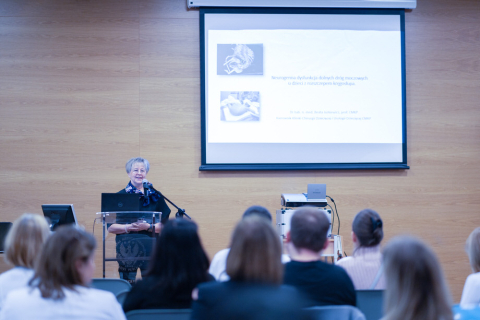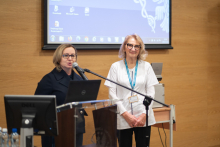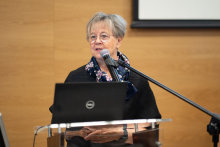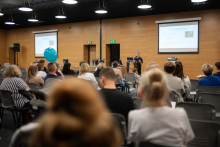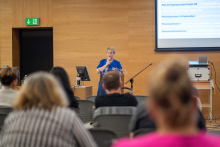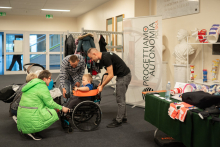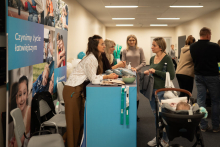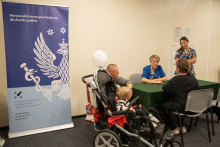The event was divided into conference and workshop parts. The conference was opened by Professor Bożena Kociszewska-Najman, Head of the Department of Neonatology and Rare Diseases UCC MUW.
- Today's meeting is the first in a series that we would like to organize - said the professor. - In our department we have a lot of children with various rare diseases. As for spina bifida, about 100 newborns were treated between 2018 and 2023. This is a very serious defect due to its complexity. Therefore, it must be handled by many specialists. At the beginning, there are neonatologists, urologists, nephrologists, neurologists, neurosurgeons, physiotherapists and many others - depending on the severity of the defect. This multidisciplinary therapy aims to help the child from the first days so that his development, health and quality of life are as good as possible.
What spina bifida is
Spina bifida in a child develops very early in fetal life, at 3-4 weeks - when a woman is often not yet aware that she is pregnant. It is also possible to diagnose this defect quite early, at 11-13 weeks of pregnancy. Spina bifida, is a defect in the spine usually in the lumbar region. The spinal cord is accentuated on the defect. This defect in Poland occurs once in a thousand births. Even before the child is born, it can be operated on. Such an operation can be performed traditionally, in the open. However, today fetoscopic (endoscopically in the uterine cavity) operations are increasingly being performed. Such surgeries are performed at the CCH UCC MUW. Once the operated baby comes into the world, it goes to the neonatology ward and under the care of specialists who take care of its further treatment.
Neurogenic bladder - a symptom not a disease
Every child with spina bifida has a neurogenic bladder, i.e. a syndrome of abnormal innervation of the lower urinary tract, as a result of which the bladder does not work as it should. What are the causes of this, how it is diagnosed and treated was explained during the conference by Beata Jurkiewicz, MD, PhD, CMKP professor, surgeon, pediatric urologist from the Department of Pediatric Surgery and Pediatric Urology at the Medical Center for Postgraduate Education Dziekanów Leśny.
Developmental physiotherapy
Parents are actively involved in the treatment of children with spina bifida. This involves not only catheterization, but also rehabilitation. At the meeting, A. Bartochowski, MA, and A. Rakowska, MA, physiotherapists from the Department of Neonatology and Rare Diseases MUW, spoke about forms of therapy at home. Meanwhile, the question of what role an urotherapist plays in the care of a child with neurogenic bladder was answered by Marta Matkowska, a nurse and urotherapist from the Department of Pediatric Nephrology at the CCH UCC MUW. The conference also featured a theme of wound healing and dermatitis prevention. Małgorzata Jadczak, MA, from the Department of Pediatric Neurosurgery at the CCH UCC MUW, had a presentation on this topic.
Workshops and individual consultations
After the conference, parents and their children had the opportunity to meet individually with physiotherapists. They were able to set therapeutic goals together and develop ways to achieve them. They were also able to gain a lot of practical information and skills from workshops on wound care and decubitus prevention, catheterization and urotherapy.
World Spina Bifida Day
This year, the Department of Neonatology and Rare Diseases UCC MUW joined the global celebration of World Spina Bifida and Hydrocephalus Day for the first time. The day was established and designated by the General Assembly of the International Federation for Spina Bifida and Hydrocephalus in Guatemala in 2011, and was first held on October 25, 2012 at the European Parliament in Strasbourg. The goal of this celebration is to raise awareness and understanding of the complex issues that exist in this severe birth defect. From October 1 to 30, 2023, regional events are being held around the world, focusing on this year's WSBHD-2023 theme: "Accessibility for All."
